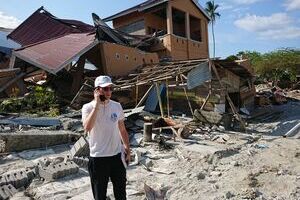Whether you’re working remotely, distance learning, or contacting a loved one during this global pandemic, we are all dependent on reliable connectivity. The emotional and psychological importance of connection and connectivity, though often underestimated, are vital says, Emmanuel Jean, projects coordinator at Telecoms Sans Frontieres
For many of us, this connectivity is easily accessible via laptops, phones and tablets. But what about those who can’t access this technology? Or those dealing with both the effects of a global pandemic, and of humanitarian crises and natural disasters?
Providing connectivity to those in crisis is one of the primary objectives of Telecoms Sans Frontieres the world’s first NGO focused on emergency response technologies. In the 20 years since its founding, it has responded to over 140 crises, in over 70 countries, providing reliable communications infrastructure to over 20 million people. Currently, TSF is working to help some of the most vulnerable people in the world remain safe, continue their education, and get on with their day-to-day activities in spite of the pandemic raging around us.
Working together to achieve a united end goal
And yet, in a moment of crisis, establishing and maintaining this connectivity is one of the biggest challenges NGOs and service providers face. Transporting physical assets like telecoms and IT equipment is difficult enough, but through disaster zones, whilst also tackling a global pandemic, it’s even harder.
This has led to the need for NGO collaborations to ensure that connectivity is being successfully established within crisis areas. With this in mind, TSF has been adapting its existing actions and identifying new ones to contribute to the global response to COVID-19.
One such project in which connectivity infrastructure is being delivered is based in Syria, where TSF has currently connected 10 hospitals and medical centres, helping local medical teams to assist more than 160,000 patients. This need for medical centres stems from the conditions in the Idlib region, where 900,000 people have been fleeing from continuous bombing.
To ensure the protection of the Syrian population, since the beginning of the pandemic the TSF response team have increased the telecommunications services to support the medical teams of the Union of Medical Care and Relief Organisations (UOSSM) on the ground, allowing medical staff to report their needs, from medical concerns to those regarding mental health and financial aid.
Technology-driven education
While telecoms infrastructure must be established rapidly in times of crisis, it must also be established in a way that offers a lasting change. During a humanitarian crisis, providing continuous educational support may not be the typical response most first think of. But what happens when the need for those first initial emergency response organisations have left the disaster zone? Communities still need to continue to survive, grow and thrive. It is during these times that needs such as education become more apparent.
This is why TSF has been working to provide Syrian refugee children with education in digital and soft skills. Its aim is to create an environment of creation, collaboration and peer-to-peer knowledge sharing. The children involved in TSF’s project will gain digital skills that will be essential for their future academic and professional development.
Despite the current climate, TSF has continued to support these children’s education. During the lockdown, rather than holding in-class sessions, TSF has moved to providing remote, social distanced learning. Since mid-October the centres where TSF is active could reopen and the lessons are partially run in class while continuing the remote support.
The team are currently supporting 200 children to continue their activities, with regular courses provided through subject-based exercises and video tutorials for each subject. When they are at home, the children are able to continue through the use of WhatsApp, and an online platform specifically developed by the technicians at TSF.
Providing technical support to those who need it the most
In the face of the pandemic, we have realised just how important connectivity is to our lives, to our health, and to our education. But when people lack access to such connectivity, the challenges they face are even more acute. This is why it is so important that we harness the potential of technologies and telecommunication to do what we can to support those facing the double blow of Covid and humanitarian crises.
The needs of communities can differ vastly, as can the specific challenges of providing aid. But, through collaborating and sharing technology, expertise and resources, we can work together to provide a united relief effort.
TSF currently has a fundraising page dedicated to providing Syrian refugee children with education in digital and soft skills. Its aim is to create an environment of creation, collaboration and peer-to-peer knowledge sharing. The children involved in TSF’s project will gain digital skills that will be essential for their future academic and professional development. For more information on the project, and to make a donation Click here.
The author is Emmanuel Jean, projects coordinator at Telecoms Sans Frontieres.
Comment on this article below or via Twitter: @VanillaPlus OR @jcvplus






